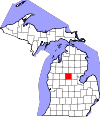Clare County Criminal Court handles all criminal cases that are filed in Clare County. See below for more information about criminal cases in Clare County.
Plea Agreements
A Plea Agreement, sometimes known as a Plea Bargain is an agreement between the prosecution and the defendant, where the defendant pleads guilty or no contest often in exchange for a lesser charge or lighter recommended sentence. A large majority of criminal cases end in a plea agreement. In Clare County you can inform your attorney to negotiate with the prosecution to attempt to come to a plea agreement, but this is dependent upon the charge severity and also the prosecutors willingness to accept a plea deal.
Who can help me in Clare County?
For general information about your case the Clare County court clerk will be able to provide legal information about your specific criminal case. Legal information is not legal advice though, the court clerk will only be able to provide information about your case, like date/time of hearings what will occur at the hearing and what you may be required to do in the hearing. They cannot provide advice about what you should do or what the best legal options may be for your particular case. Only an attorney can provide legal advice and this is your best place for information about your specific criminal proceeding. If you cannot afford to hire a private attorney to represent you, a judge will appoint an attorney to represent you, this is most often a public defender.

Clare County Criminal Court
Who is the prosecutor for Clare County?
Depending upon the case, the prosecutor for Clare County criminal cases will either be a representative of Clare County or a representative from Michigan. After reviewing evidence it is the prosecutor’s decision whether to file charges or drop a case. Most prosecutors have the ability to negotiate plea bargains, and determine how the case will be prosecuted.
Required Court Appearances in Clare County
Any required court appearances in Clare County Criminal Court must be attended by the defendant. Failure to appear in court at your required date and time may result in the judge issuing an arrest warrant.
Jury by Trial Right
The US Constitution (Article 3 along with the 6th Amendment) ensures an accused defendant the right to a jury trial. This applies to crimes that have a $500 fine or a potential sentence of six months in jail (aka Serious Crimes). This right to trial by jury can also be waived by a defendant.
What is Jury Deliberation?
After both the prosecution and defense have presented their cases, the judge in the case will provide instructions to the jury about what they must decide. The jury will be dismissed to the jury room where they will deliberate about the guilt or innocence of the defendant. After reaching a unaminous decision, they return their decision to the court where it is read aloud in the courtroom. If the jury is unable to reach a unaminous decision, the jury is deadlocked, also known as a hung jury, in which a mistrial will be declared.
Appealing a guilty verdict
A defendant may appeal a guilty verdict to an appellate court. This is not a request to have another trial, but a request for an appellate court to review the case and determine that it was handled in a correct legal manner. There are a number of outcomes in an appeal including an upholding of the conviction, a finding that errors were made resulting in a retrial or resentencing or possibly a complete disimissal of all charges.
Burden of Proof Requirement
In a criminal case in the United States, the burden of proof always requires the prosecutor to prove beyond a reasonable doubt that the defendant is guilty. This is a high threshold that must be met by the prosecution when presenting evidence in a case. If the prosecution fails in it’s burden to prove guilt beyond a reasonable doubt the judge must find the defendant not guilty. In a jury trial, the judge will inform the jury what this burden is and their obligation to find the defendant not guilty if they feel the prosecution did prove the defendant’s guilt beyond a reasonable doubt.
What happens in Clare County at an arraignment?
In Clare County the defendant is brought into court and informed by the judge of the charges that have been filed against them along with informing them of their rights. At this time, the defendant can plead guilty, not guilty or no contest. If the defendant pleads guilty or no contest, there will be no trial and the defendant may be sentenced immediately or at a later date. If the defendant pleads not guilty a trial date is set.
What if I can’t afford an attorney?
The 6th Amendment guarantees you the right to an attorney whether or not you can afford one. If you cannot afford one, a public defender will be appointed by the court to represent you.
Sentencing in Clare County
In Clare County if the defendant is found guilty (by trial or plea), the defendant will be sentenced. This sometimes occurrs immediately after being found guilty, but can also take place at a later date. In most instances, a judge will impose the sentence that is requested by the prosecution, but they also have the descretion to impose a different sentence.
Where will Clare County criminal case hearings take place?
Criminal cases will take place at the criminal courts of Clare County. See here for the location of the criminal courts in Clare County.
Clare County Criminal Court Locations
-
55th Circuit Court – Clare
Address: 225 W Main St, PO Box 438, Harrison MI 48625
Phone: 989-539-7131 Fax: 989-539-6616 -
80th District Court – Clare
Address: 225 W Main St, Harrison MI 48625
Phone: 989-539-7173 Fax: 989-539-4036